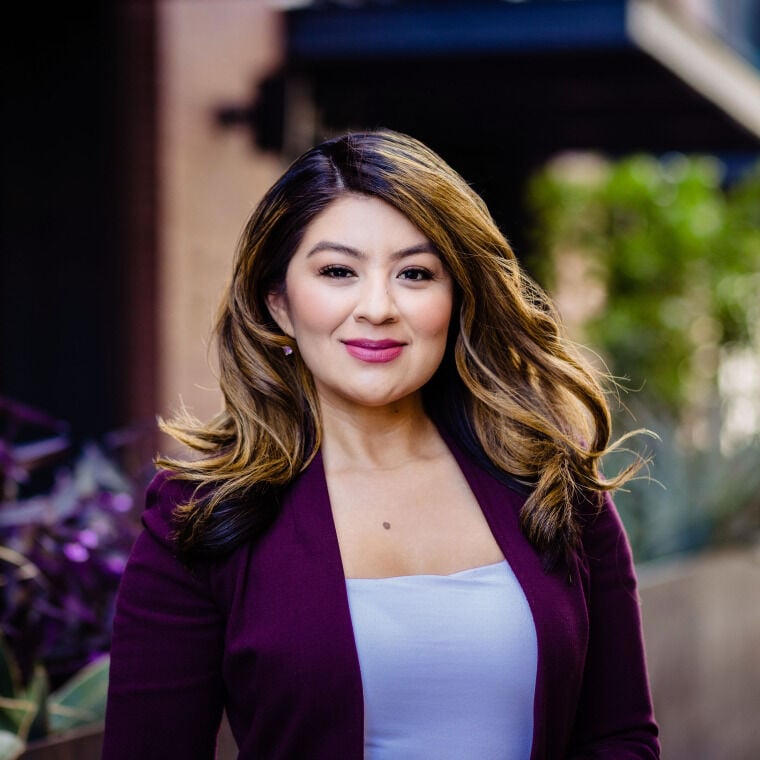A University of Arizona journalism assistant professor who is serving as press secretary for Gov. Katie Hobbs will no longer teach at the journalism school, Hobbs’ office says.
Numerous professors had raised ethical concerns about the dual roles.
Liliana Soto, a former broadcast journalist and an assistant professor of practice at the UA, began working part-time for the Democratic governor this spring. According to her LinkedIn, Soto began working as press secretary for Hobbs in March, though she only formally announced the appointment on Tuesday.
Hobbs’ communications director, Christian Slater, said Wednesday that Soto is now “full time with the governor and will not be teaching.”
Despite that, Soto is still listed on the UA course catalogue for this fall, to teach Broadcast Journalism, Beginning Television Reporting and Production, and Arizona Cat’s Eye.
In a statement to the Arizona Daily Star, Mitch Zak, a UA spokesperson, didn’t answer the question of whether Soto is still affiliated with the university.
“We congratulate Liliana Soto on her appointment as press secretary for the Office of the Governor,” Zak wrote. “However, we do not comment on individual personnel matters.”
The Star copied Jessica Retis, director of the School of Journalism, on its emailed request to Zak for comment and she did not respond.
At the UA, Soto made a yearly salary of $75,800, according to public records. Her Governor’s Office salary figure was not immediately available.
Soto did not respond to messages Wednesday seeking comment.
In her written statement Tuesday about her appointment, Soto wrote that “as an immigrant from Sonora, Mexico and proud Arizonan, it is an honor to serve the governor and the people of the state of Arizona as press secretary.”
She added, “Representation matters now more than ever and I look forward to bringing my knowledge and years of experience in bilingual journalism and academia to the team.”
Her appointment in the Governor’s Office, a partisan public role, while still teaching journalism students at UA raised concerns among colleagues. Those concerns were valid, said Samuel Freedman, a former columnist for the New York Times and a professor who studies ethics at Columbia University’s Graduate School of Journalism.
“It’s not uncommon for a professor to work for a period of time in the public sector,” he said in a statement to the Star. “But that professor should absolutely take a leave of absence during that time.”
Freedman added that “with a journalism professor doing communications for an elected official, the ethical line could not be clearer.”
After professors in the journalism school raised concerns about Soto’s position in the Governor’s Office during a spring faculty meeting, a group of students wrote a letter defending her.
“The student body is extremely disenchanted, disappointed and disgraced with the recent action of the School of Journalism faculty” in voicing the criticisms, the group of students wrote in early April.
The letter, copies of which were plastered in the journalism school’s office in the Marshall Building, stated that Soto “came to class in distress” on March 20 after “her journalism ethics (were) put into question by faculty for accepting a second part-time job in her own personal time as the press secretary for the governor’s office.”
The UA’s Threat Assessment Management Team was called in to speak to department members after a threatening letter was posted on a specific professor’s door, according to multiple professors who asked that their names not be used due to fear of retaliation.
“Your claims are unsubstantial, short sighted and dim-witted,” the letter on the professor’s door, purportedly signed by a student, read. “The fact that a majority of faculty went along with you or didn’t speak up for (Soto) shows a pathetic lack of any form of a spine, or brain. It must be so easy to voice your unfounded concern when you gang up on a person all at once. How admirable. There’s a word for that and it’s called bullying, now I’m going to bully you.”
TAMT ultimately concluded there was no serious threat, according to an email sent to journalism school faculty and staff on April 7, obtained by the Star.
“While we certainly recognize that the behavior left folks feeling uncomfortable, unsettled, and psychologically unsafe, we do not currently have safety concerns related to physical safety at this point in time,” according to the email.
The message to faculty and staff continued:
“While I understand that some of you remain uncomfortable, you may not characterize the events of last week as a threat to students. You are expected to continue your duties as assigned. If you move class online for a day, you may not state this is because of a threat and you must ensure that students have ample opportunity to attend and not miss class.”
Get your morning recap of today's local news and read the full stories here: tucne.ws/morning





